Lexus ES vs Suzuki Jimny – Differences & prices compared
Compare performance, boot space, consumption and price in one view.
Find out now: which car is the better choice for you – Lexus ES or Suzuki Jimny?
The Lexus ES (Sedan) comes with a Full Hybrid engine and Automatic transmission. In comparison, the Suzuki Jimny (Off-Roader) features a Petrol engine with Manuel transmission.
When it comes to boot capacity, the Lexus ES offers 454 L, while the Suzuki Jimny provides – depending on how much space you need. If you’re looking for more power, decide whether the 218 HP of the Lexus ES or the 102 HP of the Suzuki Jimny suits your needs better.
In terms of consumption, the values are 5.10 L per 100 km for the Lexus ES, and 7.70 L for the Suzuki Jimny.
Price-wise, the Lexus ES starts at 46600 £, while the Suzuki Jimny is available from 25300 £. Compare all the details and find out which model fits your lifestyle best!
Lexus ES
The Lexus ES represents a blend of luxury and comfort, offering a smooth driving experience that is characteristic of the brand. With its elegant design and meticulously crafted interior, it provides a serene environment for both driver and passengers. The inclusion of advanced safety features and cutting-edge technology enhances its appeal, ensuring that every journey is not only enjoyable but also secure.
details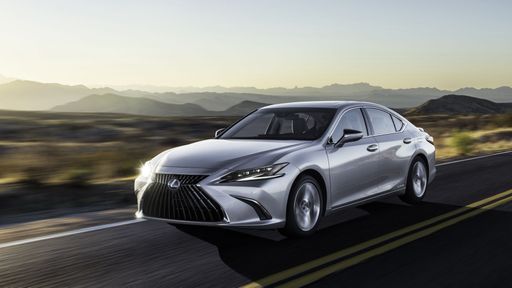 @ toyota-media.de
@ toyota-media.de
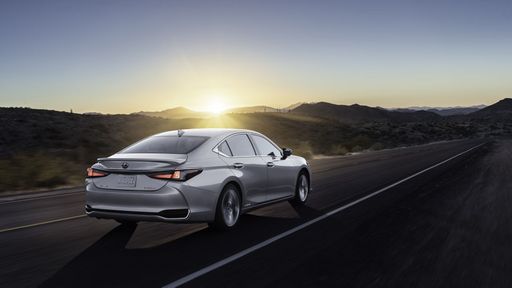 @ toyota-media.de
@ toyota-media.de
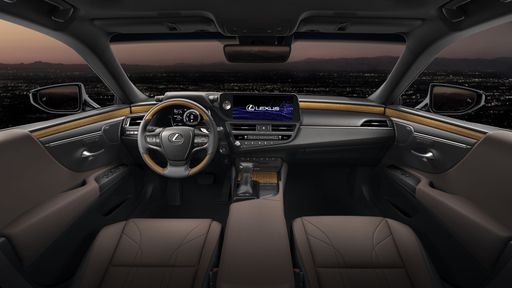 @ toyota-media.de
@ toyota-media.de
Suzuki Jimny
The Suzuki Jimny is a compact SUV that has gained a loyal following for its rugged charm and off-road capabilities. Its boxy design is both nostalgic and functional, making it stand out in a sea of more streamlined vehicles. Despite its small size, the Jimny offers a surprisingly robust driving experience, ideal for adventurous journeys off the beaten track.
details @ suzuki.at
@ suzuki.at
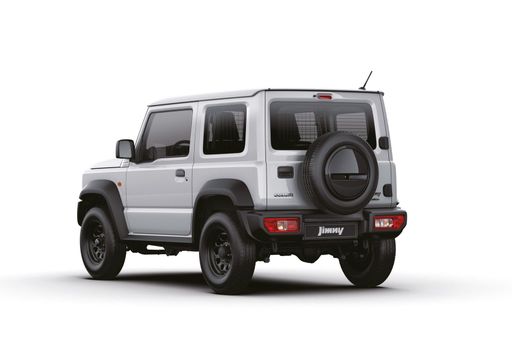 @ suzuki.at
@ suzuki.at
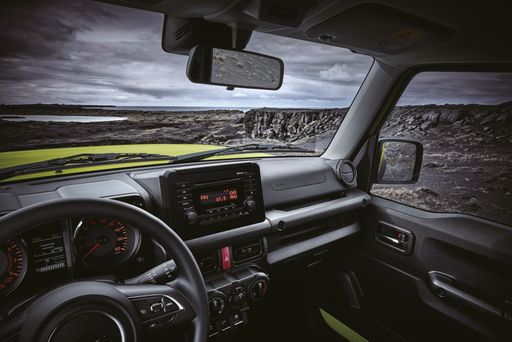 @ suzuki.at
@ suzuki.at
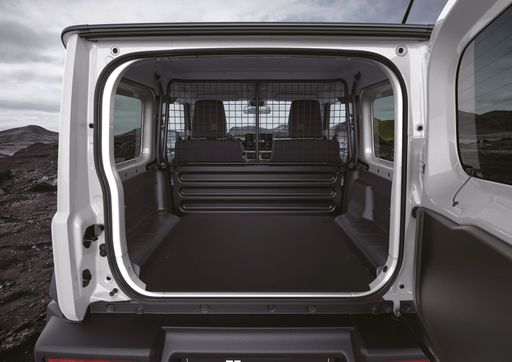 @ suzuki.at
@ suzuki.at

|

|
|
|
|
Costs and Consumption |
|
|---|---|
|
Price
46600 - 59300 £
|
Price
25300 - 27700 £
|
|
Consumption L/100km
5.10 L
|
Consumption L/100km
7.70 L
|
|
Consumption kWh/100km
-
|
Consumption kWh/100km
-
|
|
Electric Range
-
|
Electric Range
-
|
|
Battery Capacity
-
|
Battery Capacity
-
|
|
co2
115 g/km
|
co2
173 g/km
|
|
Fuel tank capacity
50 L
|
Fuel tank capacity
40 L
|
Dimensions and Body |
|
|---|---|
|
Body Type
Sedan
|
Body Type
Off-Roader
|
|
Seats
5
|
Seats
2
|
|
Doors
4
|
Doors
3
|
|
Curb weight
1680 kg
|
Curb weight
1165 kg
|
|
Trunk capacity
454 L
|
Trunk capacity
-
|
|
Length
4975 mm
|
Length
3645 mm
|
|
Width
1865 mm
|
Width
1645 mm
|
|
Height
1445 mm
|
Height
1705 mm
|
|
Payload
470 kg
|
Payload
270 kg
|
Engine and Performance |
|
|---|---|
|
Engine Type
Full Hybrid
|
Engine Type
Petrol
|
|
Transmission
Automatic
|
Transmission
Manuel
|
|
Transmission Detail
-
|
Transmission Detail
Manual Gearbox
|
|
Drive Type
Front-Wheel Drive
|
Drive Type
All-Wheel Drive
|
|
Power HP
218 HP
|
Power HP
102 HP
|
|
Acceleration 0-100km/h
8.90 s
|
Acceleration 0-100km/h
12.80 s
|
|
Max Speed
180 km/h
|
Max Speed
145 km/h
|
|
Torque
-
|
Torque
130 Nm
|
|
Number of Cylinders
4
|
Number of Cylinders
4
|
|
Power kW
160 kW
|
Power kW
75 kW
|
|
Engine capacity
2487 cm3
|
Engine capacity
1462 cm3
|
General |
|
|---|---|
|
Model Year
2024
|
Model Year
2021 - 2024
|
|
CO2 Efficiency Class
C
|
CO2 Efficiency Class
F
|
|
Brand
Lexus
|
Brand
Suzuki
|
Lexus ES
Explore the Alluring Elegance of the Lexus ES
The Lexus ES continues to uphold its reputation as a beacon of luxury and innovation in the automotive world. Known for its graceful design and premium feel, the ES series offers an impressive blend of performance and efficiency. With a focus on technical prowess and sustainability, this model is a testament to Lexus's commitment to excellence.
Performance and Efficiency: A Seamless Blend
At the heart of the Lexus ES is its full-hybrid technology. The 218 PS powertrain, featuring a 4-cylinder engine, harmoniously integrates a combustion engine with an electric motor to provide a remarkable drive. The ES achieves its impressive power output of 160 kW while maintaining a commendable fuel consumption of 5.1 L/100 km. This balance between power and efficiency is manifested in its acceleration from 0 to 100 km/h in just 8.9 seconds, powering seamlessly through a cost-effective CVT-gearbox with front-wheel drive. Despite its athletic capabilities, the ES remains well within the bounds of responsible emissions with a CO2 output rated at 115 g/km.
Design and Comfort: A Statement of Luxury
The Lexus ES's exterior is crafted as a testament to sophistication. Its sleek silhouette measures 4975 mm in length, 1865 mm in width, and 1445 mm in height, with a striking aesthetics that demands attention. The interior offers spacious comfort with seating for five, highlighted by high-quality materials and meticulous attention to detail. Additionally, the boot space offers a generous 454 litres capacity, ensuring practicality is not compromised.
Technological Advancements and Features
Equipped with the latest in automotive technology, the Lexus ES features a suite of advanced driver-assistance systems for enhanced safety and convenience. From its responsive infotainment system to the intuitive controls, each feature has been designed with the driver in mind. For those seeking variety, the car is available in several trim levels including the Automatik, Business Edition Automatik, Executive Automatik, and Luxury Automatik, offering a tailored experience for every discerning driver.
Cost of Ownership
With prices ranging from €54,350 to €69,200, the Lexus ES provides a competitive edge in the luxury segment with its multitude of features. The running costs are also reasonable, with expense estimates ranging from €1,289 to €1,497 per month and a cost per kilometre between 51.6 and 59.9 cents. This cost efficiency makes it a feasible choice for those looking to balance luxury with practicality.
Conclusion: A Hybrid of Innovation and Style
The Lexus ES stands as a prime example of how hybrid technology can transform the driving experience, merging the thrill of performance with the benefits of fuel efficiency. With its state-of-the-art features and impeccable build, the ES is a remarkable vehicle for those who seek luxury and innovation on the road.
Suzuki Jimny
Revamping Tradition with Modern Twists: The Suzuki Jimny
The Suzuki Jimny continues its legacy as a robust compact off-roader, seamlessly blending its iconic design with modern technological advancements. Whether traversing rugged terrains or cruising urban streets, the Jimny stands out as a versatile companion.
A Legacy Reimagined: Design and Build
Suzuki stays true to its roots with the Jimny's classic square silhouette. This three-door compact SUV is not just about aesthetics; its dimensions—with a length of 3645 mm, a width of 1645 mm, and a height of 1705 mm—are designed to tackle off-road challenges effortlessly. With its compact build, the Jimny fits snugly into city parking spots whilst still radiating an aura of toughness.
The Heart of the Machine: Engine and Performance
Powered by a 1.5-litre four-cylinder engine, the Jimny delivers 102 PS and 130 Nm of torque. Its petrol engine is paired with a manual transmission, offering drivers a more connected and tactile driving experience. With a fuel consumption of 7.7 L/100km, it strives to balance power and efficiency. The Jimny's maximum speed peaks at 145 km/h, while it accelerates from 0 to 100 km/h in 12.8 seconds, a testament to its steadfast performance in its category.
Mastering Terrains with ALLGRIP PRO
One of the standout features of the Jimny is its ALLGRIP PRO all-wheel-drive system, designed for serious off-roaders. This technology provides the driver with the ability to switch between 2WD and 4WD at the flick of a switch, ensuring maximum traction no matter the condition. The elevation of its chassis and its tough underbody protection mean the Jimny can handle rough landscapes with relative ease.
Comfort Meets Functionality: Interior Features
Step inside, and you'll find an interior that perfectly balances utility and comfort. The Jimny might be a two-seater, but its thoughtful design ensures ample space for both driver and passenger. The dashboard is simple yet functional, equipped with essential features that accentuate the driving experience without unnecessary distractions.
The Green Concerns: Environmental Impact
While the Jimny offers impressive off-road capabilities, its CO2 emissions stand at 173 g/km, placing it within efficiency class F. This is an area where environmentally conscious buyers might seek further innovation from Suzuki. Despite this, the Jimny remains a preferable choice for those who value performance over emission metrics.
Balancing Act: Cost and Affordability
Priced between €29,490 and €32,340, the Jimny positions itself within a competitive market segment. Potential owners will be making a modest investment for a vehicle that promises both durability and versatility. With monthly costs estimated at €940 and €0.376 per kilometre, it remains an affordable option for those who prioritise capability over luxury.
In Conclusion: A Symbol of Reliability
The Suzuki Jimny is more than just a car; it’s a lifestyle choice for adventurers who refuse to conform to the ordinary. With years of trust behind it, the Jimny has successfully adapted to the needs of the modern driver without compromising its rugged essence. Whether you're scaling new heights or navigating city landscapes, the Jimny proves itself a worthy companion on any road less travelled.
Which drive types are available for the Lexus ES?
Available as Front-Wheel Drive.
The prices and data displayed are estimates based on German list prices and may vary by country. This information is not legally binding.
